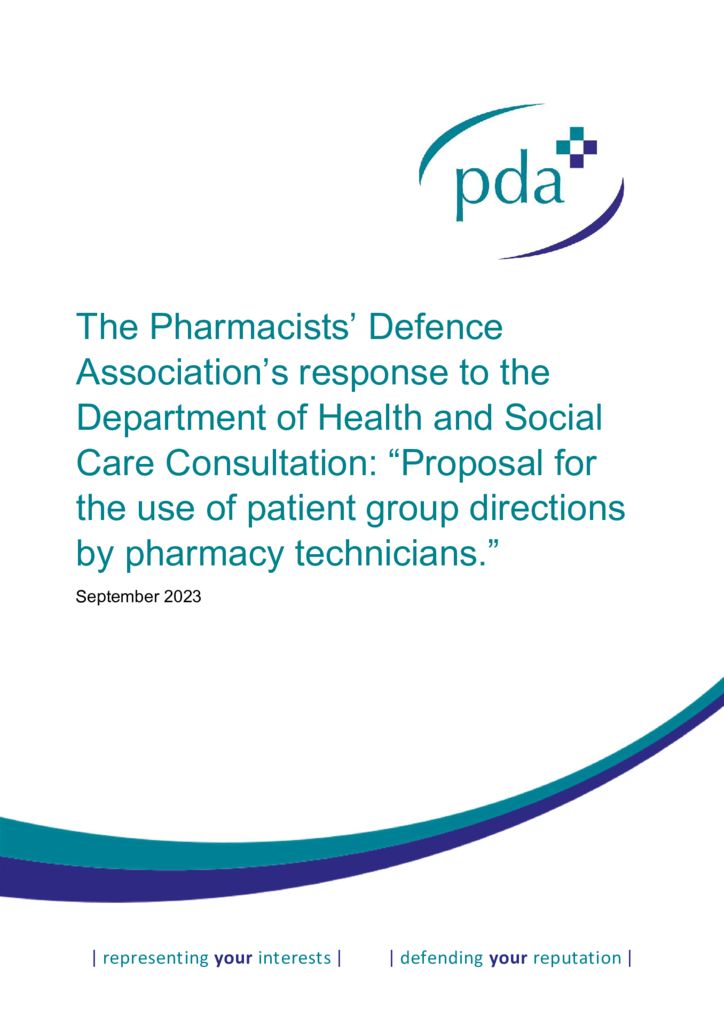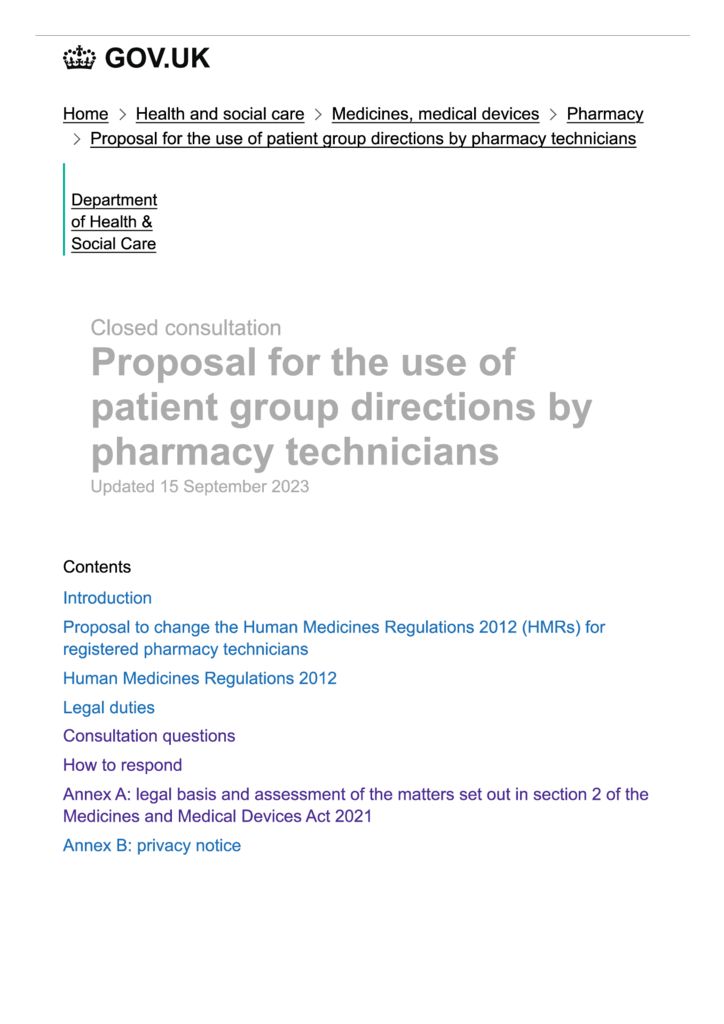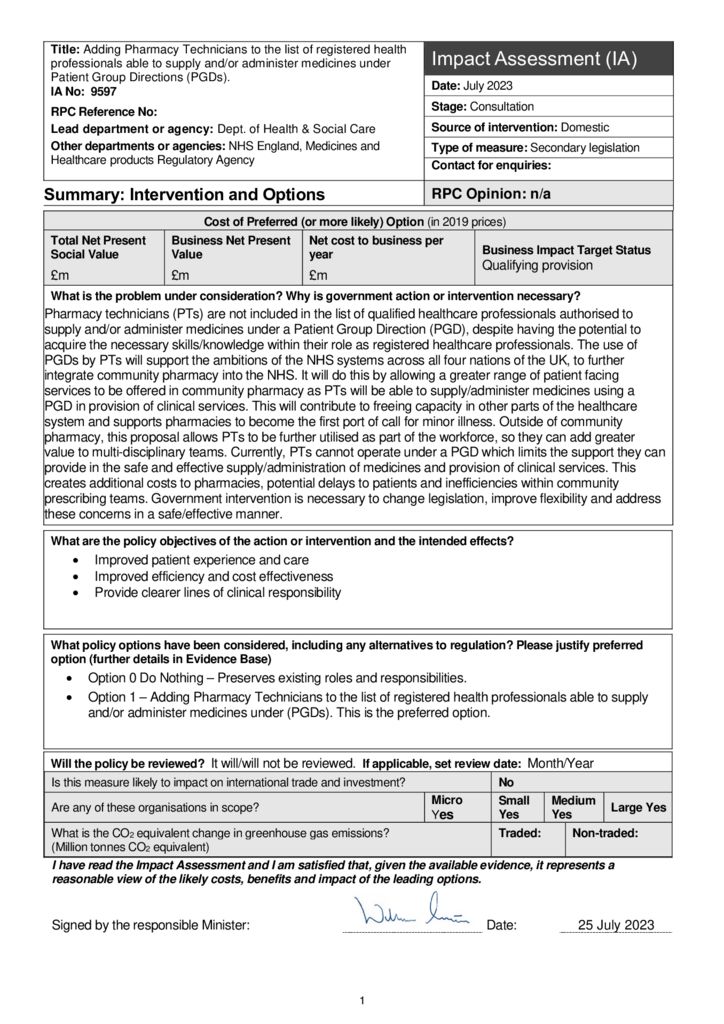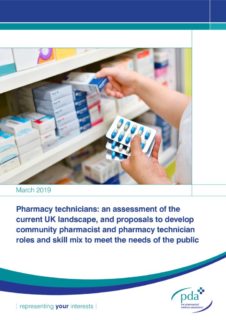The proposals from DHSC would enable registered pharmacy technicians to use PGDs across England, Wales and Scotland in any setting, including the NHS, independent and voluntary sectors. The DHSC also state that the proposal is supported by all four nations of the UK (even though pharmacy technicians are not yet registered or subject to regulation by the Pharmaceutical Society of Northern Ireland).
The consultation paper highlights that PGDs should only be used where there is clear benefit for patient care without compromising patient safety and where there are clear governance arrangements and accountability.
After seeking feedback from members, the PDA has responded to the online, word-limited (responses were limited to 150 words) DHSC consultation and, following an appeal to do so, was allowed to submit a more detailed response. There are several fundamental patient safety concerns that need to be taken into account, which are outlined in the PDA submission.
The core issue of underpinning education
The consultation document explains how PGDs operate and lists the healthcare professionals that are currently authorised in legislation to supply or administer medicines under a PGD. Interestingly, the consultation document does not acknowledge that these healthcare professions have a minimum underpinning education at level 5 (with the majority having a level 6 or 7 qualification) whereas pharmacy technicians only have a basic level 3 qualification.
The central theme of the PDA response is around patient safety and the appropriateness and readiness of the current pharmacy technician workforce to safely supply or administer medicines under the existing criteria for using a PGD. Around 50% of the current pharmacy technician workforce (this figure is from a freedom of information release from the General Pharmaceutical Council (GPhC)) entered the register via a grandparent clause and the GPhC does not hold the education records for this group. A substantial balance of the remaining 50% have joined the register having completed the older, pre-2017 training courses and even the 2017 revised standards only require a level of knowledge equivalent to a basic level 3 in biology, chemistry, microbiology and physiology and a knowledge of basic pharmacological principles.
The central underpinning requirement for the use of a PGD by a healthcare professional is that this one individual healthcare professional undertakes the whole process from start to finish. No part of the process can be delegated, this includes making the clinical decision on whether the product is safe and suitable for that individual patient following a full and comprehensive history taking, including an analysis of underlying medical conditions, contra-indications and dose adjustments. Whilst PGDs can stipulate additional training requirements before a healthcare professional undertakes using the PGD, this is not a substitute for the underpinning level of knowledge required to make this clinical decision on whether to supply or administer the medicine identified in the PGD.
Skill mix or role substitution?
The DHSC consultation proposal would add pharmacy technicians to the group of healthcare workers that are already authorised to use a PGD. It proposes that the decision for a pharmacy technician to supply or administer a medicine under a PGD would be taken by an [employer] organisation based on clinical or business need; effectively, this premise confuses the positioning and authority of the Responsible Pharmacist, in so far as it relates to their statutory responsibility to secure the safe and effective operation of the pharmacy. As the PDA has outlined in its response, this appears to be a basic role substitution based on cost-cutting and not the pharmacy skill mix which has in the past been central to DHSC policy.
The PDA strongly advocates for a skill mix model, which leans into the clinical training and expertise of a pharmacist, and the technical training and expertise of a pharmacy technician and seeks a collaborative approach which enhances professional fulfilment for both groups. This includes the supply and administration of medicines by pharmacy technicians when all members of the team work together within the limits and boundaries of everyone’s underpinning clinical knowledge. The current proposals blur the distinction between the two roles and, when terms such as ‘pharmacy professionals’ are used it gives the impression that they are one homogenous group. This can bring concerns around competency and expanding technical roles beyond capabilities, potentially leading to professional tension rather than collaboration. The PDA believes that when patient safety is at stake, proposals must be based on a strong foundation of proper skill mix, education, training and governance, and not purely ideology and cost saving.
Pharmacy technicians are valuable members of the pharmacy team and whilst the PDA does not support the proposals around PGDs for the reasons outlined in its response to the consultation, it is keen to work with DHSC, NHS policy makers and other stakeholders to find a solution which meets the needs of patients and the NHS, provides professional fulfilment for pharmacists and pharmacy technicians utilising their own unique skills and training, and which above all is based on safe practice and good governance.
Whilst this falls outside the scope of the response to the questions in the consultation, the DHSC should put into context this PGD consultation with the wider changes that the DHSC is considering including the development of pharmacist independent prescribers, supervision and the potential changes around the delegation of tasks to a pharmacy technician by a responsible pharmacist.
READ THE PDA’S FULL RESPONSE HERE
READ THE CONSULTATION DOCUMENT HERE
READ THE IMPACT ASSESSMENT DOCUMENT HERE
READ THE PDA’S PHARMACY TECHNICIANS REPORT HERE
Learn more
- Consultation on proposals to enable pharmacy technicians to supply and administer medicines under PGDs
- PHARMACY ECO-SYSTEM: Appropriate decisions needed on skill mix and respective responsibilities of pharmacists and pharmacy technicians
- PDA responds to APTUK/PCPA consultation on possible national competency framework for primary care pharmacy technicians
- PDA report suggests action on grandparenting and educational standards of pharmacy technicians is required
- PDA releases their Pharmacy Technicians Report in its entirety
- Proposal for the use of patient group directions by pharmacy technicians
Not yet a PDA member?
If you have not yet joined the PDA, we encourage you to join today and ask your colleagues to do the same.
Membership is FREE to pharmacy students, trainee pharmacists, and for the first three months of being newly qualified.
Read about our key member benefits here.



